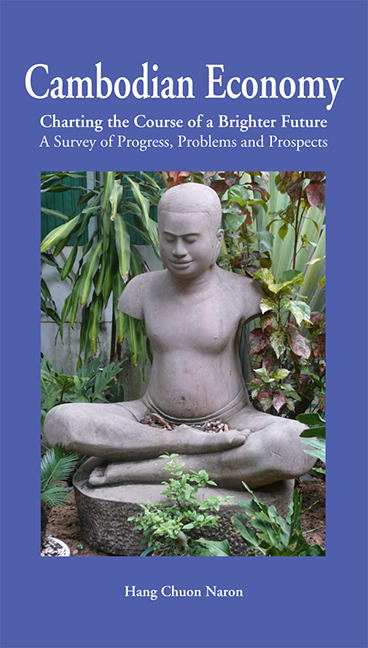 Cambodian Economy
Cambodian Economy Book contents
- Frontmatter
- Contents
- Foreword
- Preface
- INTRODUCTION
- Symbols and abbreviations
- PART I GEOGRAPHY AND POPULATION
- PART II MACROECONOMIC FRAMEWORK
- PART III THE CHALLENGE OF MODERNIZING AGRICULTURE
- PART IV THE CHALLENGE OF INDUSTRIALIZATION
- PART V SERVICES AND INFRASTRUCTURE
- PART VI HUMAN RESOURCE DEVELOPMENT
- Chapter 17 Poverty Situation
- Chapter 18 Education
- Chapter 19 Health
- PART VII PUBLIC FINANCE
- PART VIII INTERNATIONAL ECONOMIC RELATIONS
- PART IX CONCLUSION
- Bibliography
- About the author
Chapter 18 - Education
from PART VI - HUMAN RESOURCE DEVELOPMENT
Published online by Cambridge University Press: 21 October 2015
- Frontmatter
- Contents
- Foreword
- Preface
- INTRODUCTION
- Symbols and abbreviations
- PART I GEOGRAPHY AND POPULATION
- PART II MACROECONOMIC FRAMEWORK
- PART III THE CHALLENGE OF MODERNIZING AGRICULTURE
- PART IV THE CHALLENGE OF INDUSTRIALIZATION
- PART V SERVICES AND INFRASTRUCTURE
- PART VI HUMAN RESOURCE DEVELOPMENT
- Chapter 17 Poverty Situation
- Chapter 18 Education
- Chapter 19 Health
- PART VII PUBLIC FINANCE
- PART VIII INTERNATIONAL ECONOMIC RELATIONS
- PART IX CONCLUSION
- Bibliography
- About the author
Summary
Human resource development is both an outcome and a driver of the economic and social development of a country. Skills acquired by the people, their values and attitudes, are necessary to increase productivity. This by itself may not be enough since “work productivity is subject to the health and nutrition of the work force. People need the necessary physical and mental endurance, first to learn economically useful techniques, then to apply them to the workplace.” As a country develops it is able to devote an increasing part of its resources to human development. The development challenge is to establish this virtuous cycle.
Background
The foremost task in development is providing primary education for all. The investment in primary education can have important benefits, including high rates of productivity and laying the foundation for higher education which is necessary for innovation and growth. A better educated population is also more sensitive to the evolution of civil society and unlikely to tolerate violent conflicts.
Three obstacles should be overcome in the provision of education: limited education opportunities, unequal chances of access to these opportunities, and the poor quality of teaching. Education is the primary tool to break the vicious circle of poverty that entraps rural population.
Cambodia's educational system was totally reconstructed in 1979, with the establishment of the Ministry of National Education. The first primary school was re-opened in Phnom Penh in September 1979, followed by the reopening of the Sisowath High School. In the area of high education, the Faculty of Medicine was the first to be reopened to respond to the challenges of health issues following the Khmer Rouge period. In 1981, the Institute of Technology, staffed with Soviet teachers and professors, was re-opened to respond to the need for Cambodia's reconstruction.
However, by the late 1990's the sector was faced with national education service that lacked coherence. The services delivered were not always sufficiently equitable and did not always provide full national coverage (Quinn, 2009a, p. 3).
- Type
- Chapter
- Information
- Cambodian EconomyCharting the Course of a Brighter Future - A Survey of Progress, Problems and Prospects, pp. 379 - 392Publisher: ISEAS–Yusof Ishak InstitutePrint publication year: 2012


